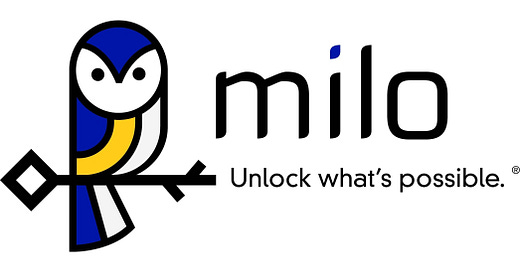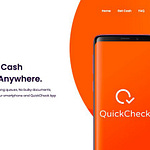Hey y’all!
I hope you had a terrific week! I’m visiting New Jersey this week. I checked into my hotel, walked towards the elevator when I ran into this:
This is a first! I’ve seen Bitcoin ATMs before but never in a hotel. The narrative I’d heard was that there are 2 main sets of Bitcoin ATM users in the US. The first set are immigrants. They buy and send Bitcoin as a means of sending and saving funds for loved ones in their home countries ex Venezuela, Mexico and Nigeria. This is particularly helpful for people who might be undocumented migrants in the US - they may not be able to have a conventional bank account. The second set are people who value anonymity. They like to use cash to buy Bitcoin.
Have you used a Bitcoin ATM? If yes, what was your use case? What was your experience?
Personally, I don’t love them because the fees are way higher than crypto exchanges. I am curious about the economics of owning Bitcoin ATMs. Might be a interesting side hustle to pursue. Maybe I’ll do a deep dive to investigate assess first.
On my mind🧠
Introducing the world’s first Bitcoin mortgage: Milo! 🚀
Background
Milo! Depending on where you grew up, the word “Milo!” evokes memories of a sweet chocolatey drink ☕ or the 10th mayor of Tel Aviv. I’m in the first group. Yum!
Milo Credit is a global digital bank founded in 2018 to reshape mortgages for global consumers. Most people around the world don’t have access to a mortgage. They often never own a home. Many of those that do gradually build a house painstakingly over years as their funds allow.
This month, Milo Credit launched the first Bitcoin mortgage. They are offering 30-year mortgages up to 100% of the house cost as long as you provide surplus Bitcoin collateral. The interest rates are low and payment plans are flexible and adjustable.
So for example, if you wanted to buy a $200k condo, you might be required to provide $300k Bitcoin collateral. Milo establishes a minimum LTV (loan-to-value) - it’s 67% ($200k/$300k) in this example . My guess is that you would get a lower interest if you provide significantly higher collateral.
But that’s not all. We all know that the price of Bitcoin can be volatile. Milo would monitor the LTV ratio as the price of Bitcoin evolves. Milo would set a LTV ratio at which the borrower would need to either provide more Bitcoin or pay down the loan. Milo might also set an LTV ratio at which the borrower goes into default or loses the collateral. I’d love to learn more about the fine prints.
So continuing the example, if the price of Bitcoin dropped by 50%. The LTV ratio would then become $200k/$150k = 133%. I’m guessing Milo might set the limit for the LTV around 80-100%. This would trigger the borrower to provide more collateral to bring the loan LTV back into balance or risk a default.
Takeaway
Look, no one wants to be this guy:
The Bitcoin Mortgage is NOT a mass-market product. It’s targeted at the lucky few who have bags of Bitcoin but don’t want to sell the underlying asset. It makes sense not to sell today if you believe the value will rise over the next 30 years.
But the devil will be in the details. I’m keen to understand the terms and conditions of the mortgage. The lending risk is somewhat mitigated by the fact that the bank could repossess the house if the value of Bitcoin crashed.
This is an important first step. We still have a long way to go before uncollateralized crypto loans are possible and we are able to extend mortgages to people who don’t have access today. We will get there!
News📰
1. Coinbase is subject to class-action lawsuit🚨
3 individuals who purchased crypto through Coinbase have filed a class action lawsuit against the firm. They allege that Coinbase operated as an unregistered securities exchange because they claim that 79 of the tokens listed on the website are securities.
This lawsuit is not unexpected. The Chair of the SEC is thought to hold the view that many tokens/cryptocurrencies except Bitcoin, Ethereum, dollar-backed stablecoins are securities. If this is true, then Coinbase and other crypto exchanges would be required to register as securities exchanges and adhere to additional requirements.
I don’t think there is cause for extreme alarm. This is bigger than Coinbase. I hope this lawsuit nudges the industry closer to achieving clarity and supportive legislation.
2. Crypto goes to Congress: Dems split 💔🪓
Democratic party is split on crypto. But it’s not progressives vs centrists. The progressive wing is split. On one hand, Sen Elizabeth Warren is a vocal opponent concerned about consumer protections. On the other hand, folks like Rep Ritchie Torres (NY) are embracing the potential to reach the unbanked and cut lower the cost of services.
I liked this quote from Rep Torres:
“The project of radically decentralizing the internet and finance strikes me as a profoundly progressive cause….You should never define any technology by its worst uses. ... There’s more to crypto than ransomware, just like there’s more to money than money laundering.”
This week, Congress questioned leading crypto experts on the potential of Russia to use crypto to launder money and evade sanctions. TLDR: No evidence to suggest that this happening at scale. Here’s the link if you are curious:
3. 68% of US millionaires own crypto 💸💰💲
Survey from Motley Fool finds that we are in good company!
Bitcoin is preferred. 60% of US millionaires own some Bitcoin while 50% of them own Ethereum. Turns out they aren’t immune to memecoins with 86% saying they had invested in the likes of dogecoin and Shiba-Inu
Looking ahead, 59% expect to allocate more of the portfolio to crypto over the next 5 years while 50% of those who don’t currently own any crypto plan to buy some within the next year.
Public Service Announcement: It’s less than a month before Tax Day. Commiserations to my crypto trading friends. Let me know how it goes and what tools helped you.
O dabo
Afo

















Share this post